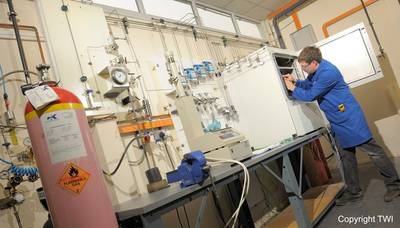A joint industry project (JIP) has been launched between Swagelining Limited, Saudi Aramco and The Welding Institute (TWI) to conduct investigations into the use of polymer lining in carbon steel pipelines. The JIP will examine the extent of corrosion incurred in a polymer lined pipeline when subjected to a sour hydrocarbon fluid environment.
Between the three parties, a total of £330,000 has been invested into the project, which commenced in October 2014 and is expected to last 30 months.
Dr. Steve Brogden, technical engineering manager at Swagelining Limited, said, “When compared with corrosion resistant alloys, polymer lining systems are attracting growing interest within the pipeline industry. This comes as a result of significant cost advantages, increased corrosion prevention and reduced fabrication and installation time.
“All three parties felt that it was time to build upon this interest and demonstrate concrete evidence of how polymer lining can perform under a range of conditions.
The JIP is divided into two parts. Part A, sponsored by Swagelining and Saudi Aramco, will use applied testing on lined pipe sections to determine the corrosion rate during simulated service conditions for 180 days.
This section of the JIP will also look at the occurrence of liner collapse during multiple pressure cycles, and how this can be prevented by implementing an internally vented system which will be represented by Swagelining’s LinerVent.
Part B is funded by TWI and will look to gain an understanding of the transport processes through the partially confined polymeric layer. TWI’s diverse expertise means that it is able to deal with all of the material components of the project.
The JIP has plans for further growth, achieved through sponsorship and involvement from other organizations, which will allow additional, more extensive testing of higher temperature polymeric and composite liners.
Dr. Brogden added, “We hope to attract input from further parties which can add value to this JIP, particularly in the latter stages as we look to perform tests under strenuous conditions. As the offshore oil and gas industry continues to move into more hazardous and extreme environments, it is critical that we demonstrate how polymer lining systems can continue to be used.”
Paul Woollin, director of research at TWI, said, “There is appreciable interest in the use of polymer lined pipe for affordable, corrosion resistant hydrocarbon production. Currently, there is a lack of supporting integrity data, in particular for sour fluids, to provide sufficient confidence for widespread use. TWI’s JIP specifically aims to address the primary issues from an industry perspective, namely the enduring concern of ‘liner collapse’ and risk of corrosion of the carbon steel pipe.
“Supporting work in the TWI Core Research Programme aims to underpin the JIP by providing a fundamental understanding of both the time-dependent alteration in the polymer layer and processes occurring at the polymer-carbon steel interface.”






